- Being wise about own emotions and emotions of the clients and people around.
- Ability to address issues of others without getting emotionally involved.
- Possessing skills emotional management.
- Being a role-model.
“Developing higher levels of emotional intelligence has been proven to be the single most powerful thing you can do to advance your career, professional and personal relationships, and overall happiness” (Mitten, 2013).
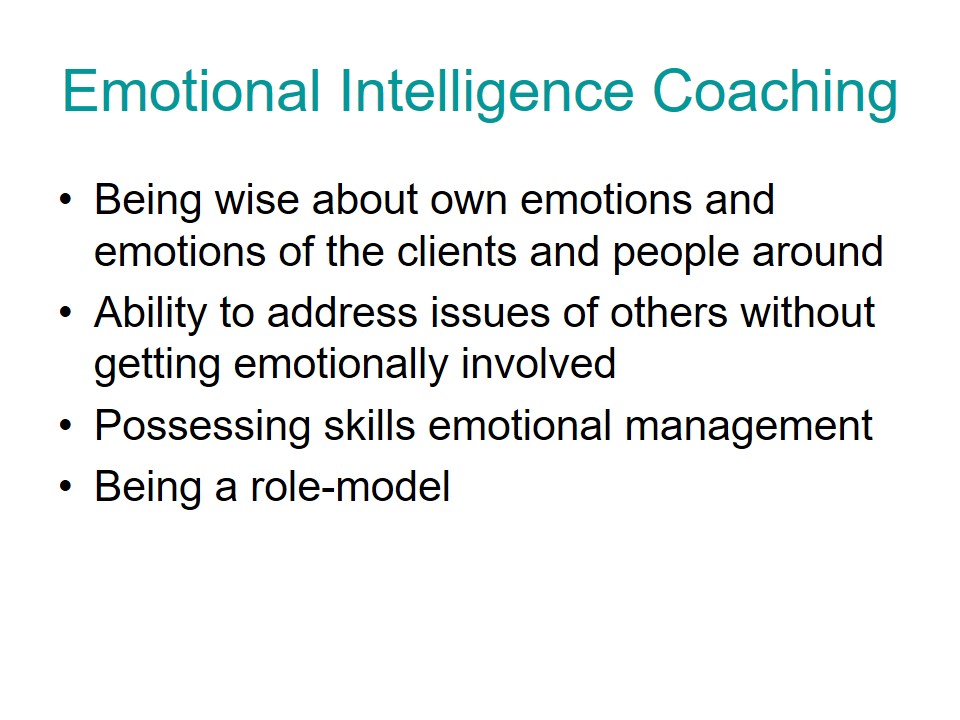
EI gives abilities
- To be a good leader.
- Manage relationships.
- Impact and inspire others.
- Regulate own behavior.
EI influences productivity and efficiency of a worker, helps with team collaboration.
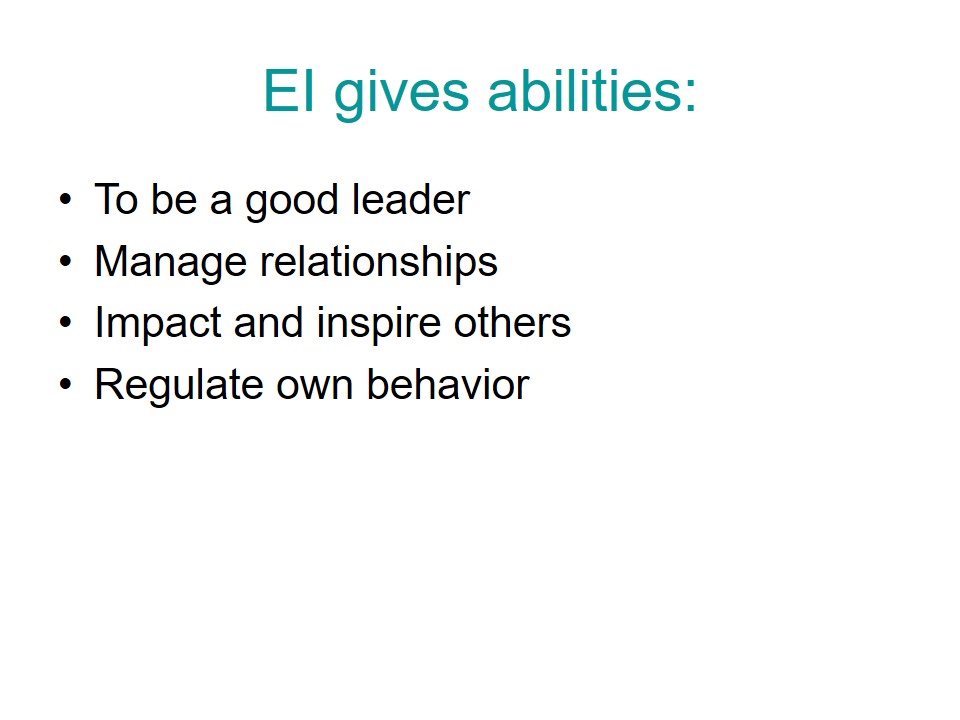
Most workplaces
- Believe that EIC benefits their organization.
- Improves the company’s bottom line.
- Have a part of their managers as coaching staff.
- Use external coaches.
- Encourage their managers to get trained as coaches.
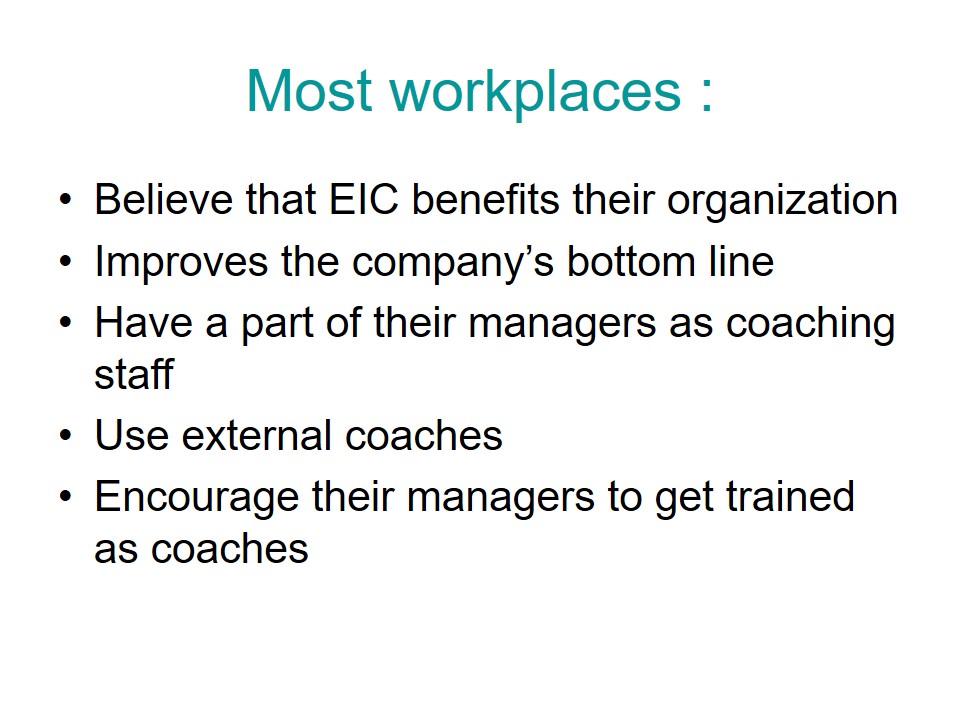
Emotional Intelligence Coaching (EIC)
Selection reasons:
- Challenging (not every coach can master this area and skills needed for that).
- Highly professional (EIC characterizes a mentor as a rare talent).
- Very helpful (skills and training in EIC can help cope with difficulties of professional and personal character).
- Inspiring (being an emotional intelligence coach gives an opportunity to create significant influence on people’s lives and wellbeing, inspire and empower).
My ex-manager once said I was an emotional intelligence coach and she did not like it that served as the main reason that made me research the field of Emotional Intelligence Coaching. Reading about this sphere of coaching seemed attractive and quite natural to me.
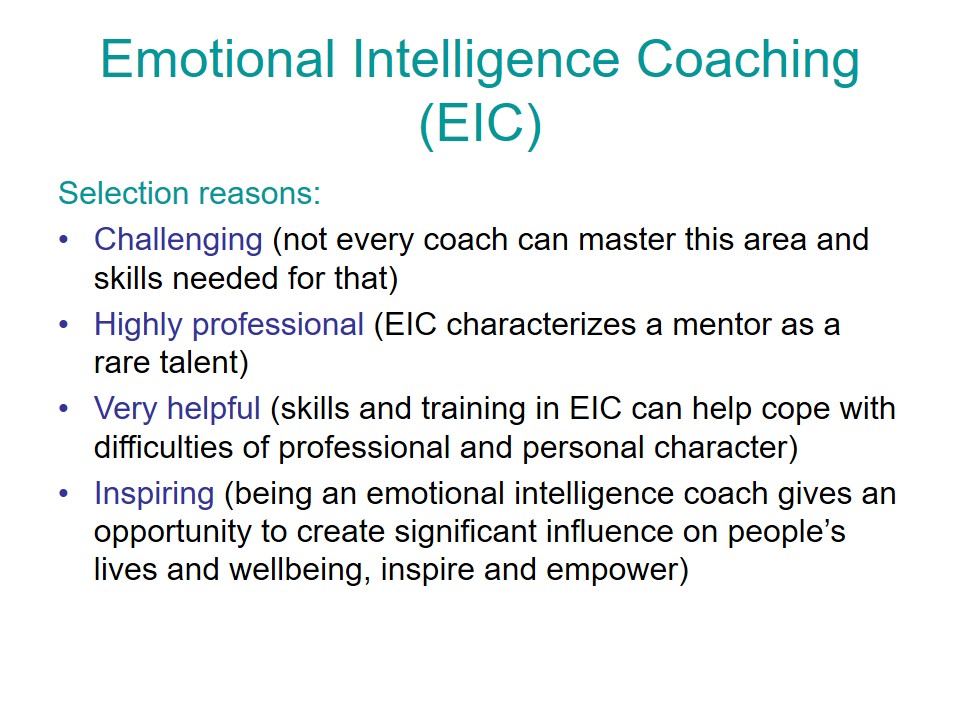
Emotional Intelligence Coaching
- Is not counseling or therapy.
- Is the capacity to perceive, process, understand, address and manage emotions of others as well as own emotions.
- Is focused on a client’s professional performance.
- Views emotions as the base of people’s actions and decisions.
- EI skills are extremely important in business.
Emotional Intelligence means knowing how to deal with own feelings and feelings of others (Emotional Intelligence Coaching, 2014). Emotional Intelligence Coaching does not focus of giving a person advice about the issues in their private life. This type of coaching is aimed at viewing how various negative impacts influence the client’s performance at work and create limitations or unpleasant environment.
The meaning of emotions should not be underestimated. Emotions are the moving force of all our actions and they are the base of the decision-making process (. This is why it is extremely important for a coach to know how to understand the emotional roots of the client’s workplace problems and be able to express their meaning and show the ways to address this issue.
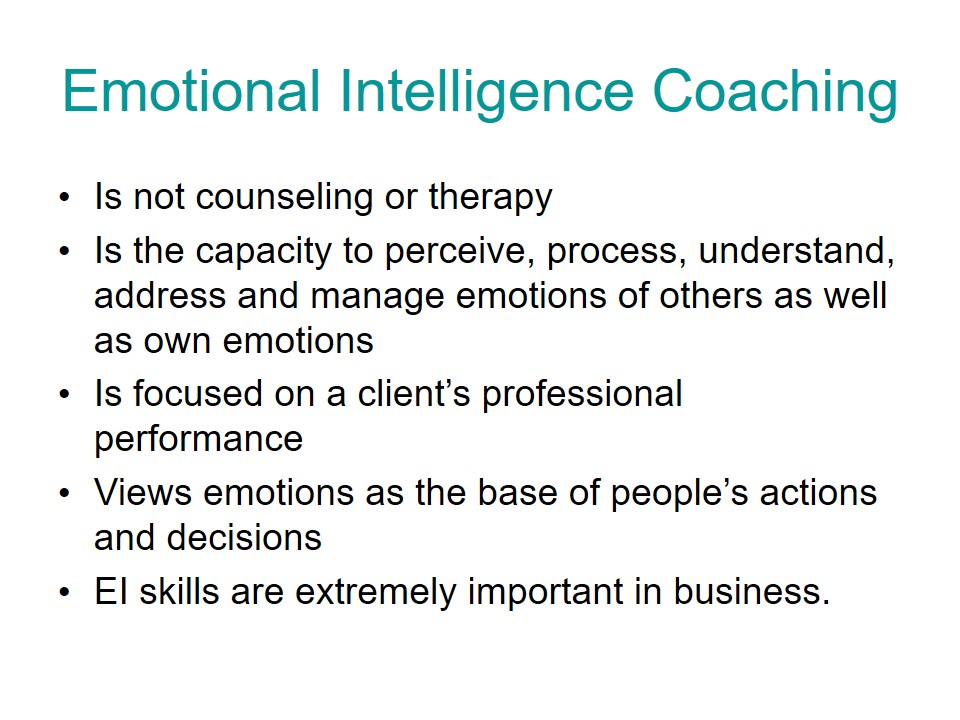
Skills of a good Emotional Intelligence Coach
- Self-awareness.
- Ability to model the type of behavior that the coach encourages other to have.
- Self-regulation.
- Motivation.
- Empathy.
- Ability to explain and direct.
- Carefulness.
- Critical thinking.
A good coach is required to be aware of their behavior, watch their emotional state, be able to have a critical look at the situation they have to deal with.
A good successful coach is the one that is able to act as a walking example of the correct emotional behavior – this is the best advertisement of the coach’s professionalism and high level of emotional intelligence.
Besides, the coach needs to know how to address the issues they are having, notice and regulate their own behavioral patterns.
Motivation goes without saying, as this is an essential feature of any qualified specialist.
Empathy is important for the coach to have a deeper view of the client’s problems, their roots and causes.
The coach needs to identify the issue and address it properly, applying individual approach to the client, be clear and descriptive.
Emotional issues are always a very sensitive topic for the clients, this is why the coach needs to be tactful and show careful ethical approach.
Critical thinking is the coach’s ability to not get personally and emotionally involved into the client’s issues, being able to analyze them soberly and effectively. Compassion is important, yet the coach always has to stay objective.
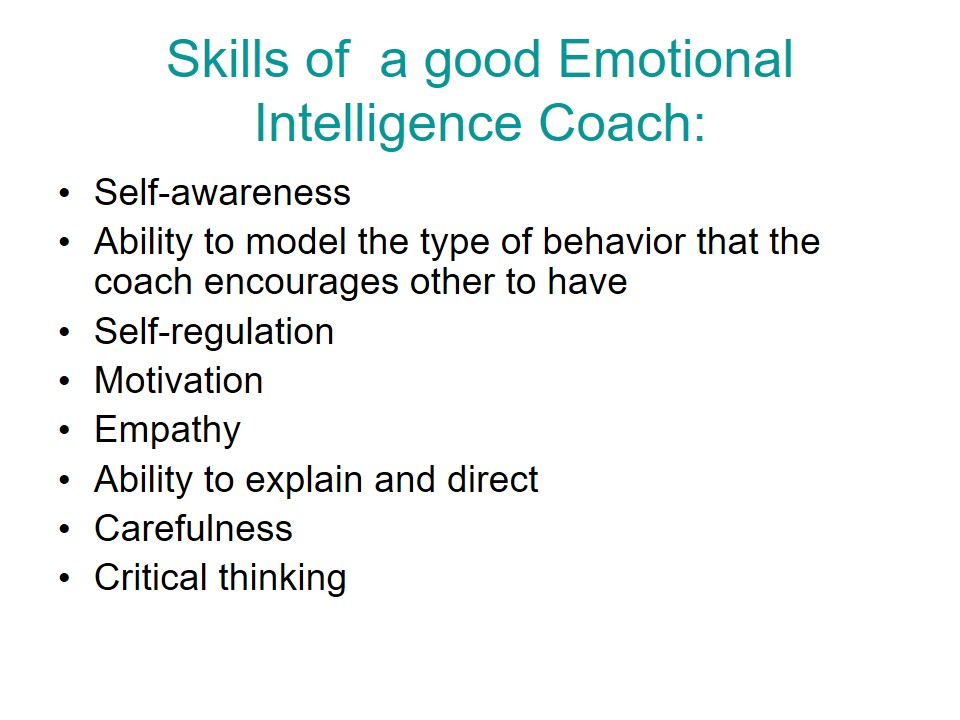
- Advantages:
- Good outcome for the clients.
- Conflict resolution.
- Self-development.
- Disadvantages:
- Clients may feel reserved and refuse to share.
- Differences between the person’s self evaluation and the coach’s idea.
The advantages of Emotional Intelligence Coaching are obvious. This type of coaching is very useful and needed as almost every workplace has issues of emotional character between the employees, and the development of their emotional intelligence is the best and quickest way help. This is why among the advantages there is conflict resolution. Besides, working with various types of clients and various issues and situations, the coach improves their own professional skills (Can Coaching Have an Impact on Emotional Intelligence?, 2010).
Disadvantages of working in the field of Emotional Intelligence Coaching are that the majority of the clients will have skeptical attitude towards such coaches, for most people it is not easy to open up to a mentor and speak about various emotional issues that impact the person’s professional performance. Moreover, in many cases even the most experienced coach is unable to break through to the client, because the clients way of self-perception and the coach’s view from the side simply do not match. In such situations the clients will not accept the feedback the coach suggests.
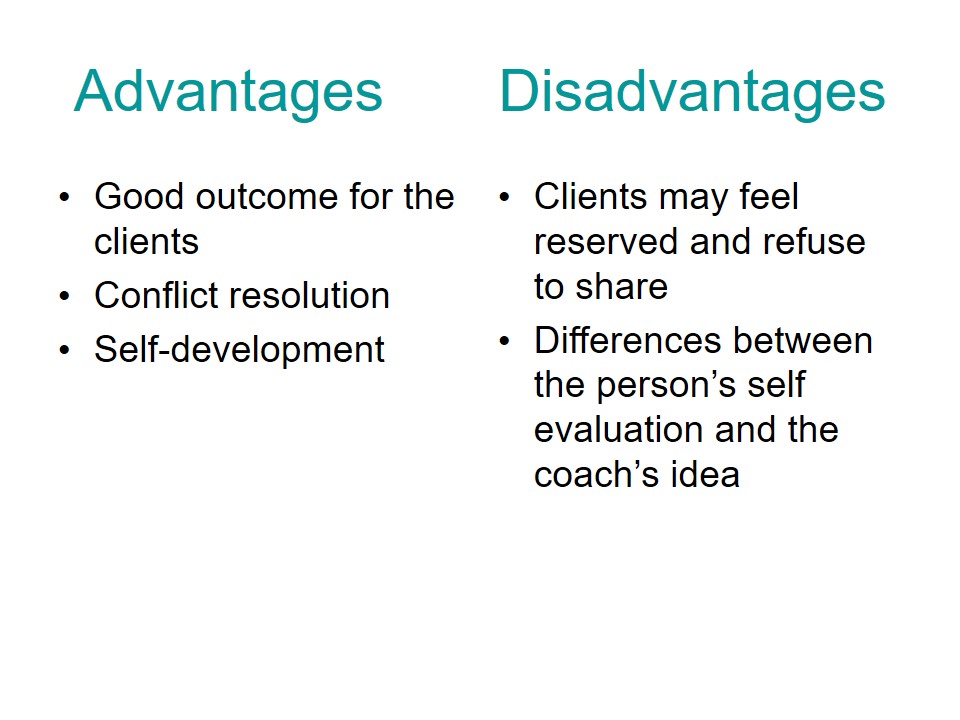
Tips for the coaches
- Constantly improve your professional skills and performance.
- Master the correct values and views.
- Frequent practice of coaching at the workplace.
- Deeper conversations in cases where the coaching and training did not help.
Frequent practice and the development of own emotional intelligence is what makes a successful coach. The coach has to always learn and remember – living a life is like riding a bicycle: once you stop moving – you start falling down.
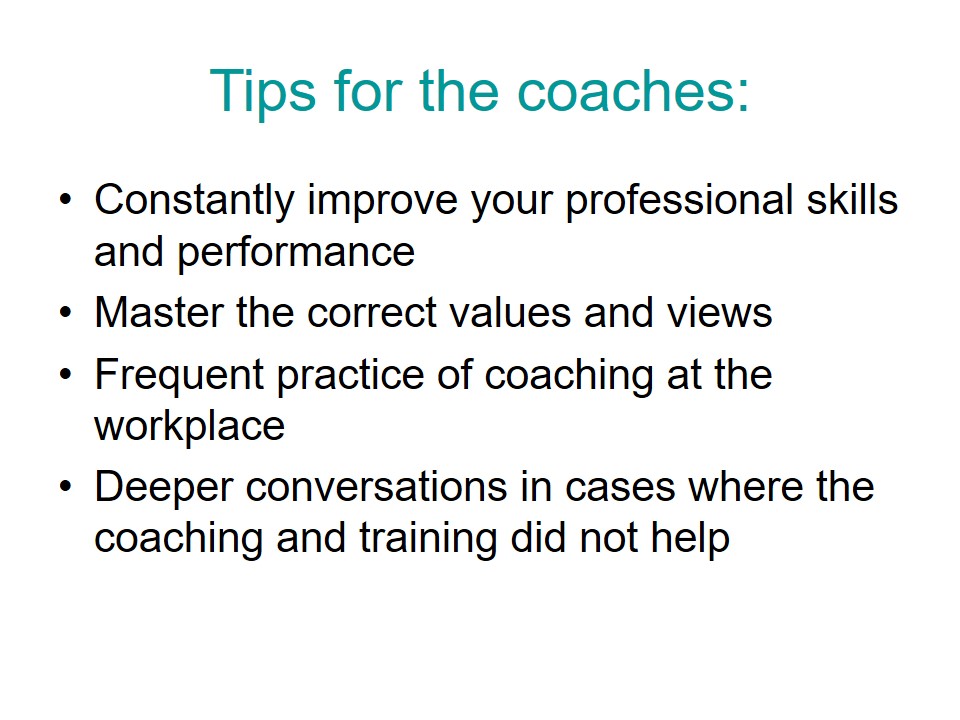
Reference List
Can coaching have an impact one emotional intelligence? (2010). American Management Assosiation. Web.
Emotional Intelligence Coaching. (2014). LifeCoaching. Web.
Mitten, S. (2013). Emotional Intelligence Coaching. Web.